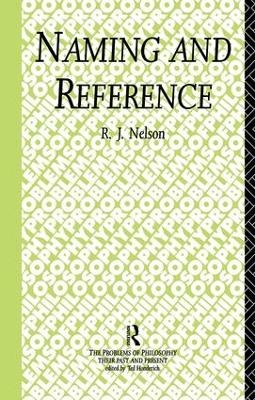
Naming and Reference
The Link of Word to Object
Seiten
2015
Routledge (Verlag)
978-1-138-87138-0 (ISBN)
Routledge (Verlag)
978-1-138-87138-0 (ISBN)
Nelson looks at how language relates to the world and more particularly at the referring power of names. The first half of the book details the history of the subject from Locke onwards and is followed by Nelson's own reference theory.
The question of how language relates to the world is one of the most important problems of philosophy. What the word `God' refers to and the question `Does God exist?' are clearly linked. The existence or non-existence of God (or electrons or unicorns) is directly related to the issue of what and how a name names. Naming and Reference tackles the challenge of explaining the referring power of names. More specifically it explores the reference of lexical terms (especially proper names and pronouns) and the issue of empty or speculative names such as `Satan' and `leptons'. The lack of semantics of such terms is a serious difficulty for linguistics, cognitive science and epistemology. In the first half of the book, a survey of the history of the subject is made from Locke to Kripke and Fodor. The second half contains a theory of reference which takes seriously the causal notion of reference, while at the same time preserving Frege's distinction between sense and reference. The algorithmic theory of reference that results treats reference in explicitly non-semantical terms. It incorporates or reflects the latest work in computational logic, cognitive science, philosophy of mind, linguistics and brain biology.
The question of how language relates to the world is one of the most important problems of philosophy. What the word `God' refers to and the question `Does God exist?' are clearly linked. The existence or non-existence of God (or electrons or unicorns) is directly related to the issue of what and how a name names. Naming and Reference tackles the challenge of explaining the referring power of names. More specifically it explores the reference of lexical terms (especially proper names and pronouns) and the issue of empty or speculative names such as `Satan' and `leptons'. The lack of semantics of such terms is a serious difficulty for linguistics, cognitive science and epistemology. In the first half of the book, a survey of the history of the subject is made from Locke to Kripke and Fodor. The second half contains a theory of reference which takes seriously the causal notion of reference, while at the same time preserving Frege's distinction between sense and reference. The algorithmic theory of reference that results treats reference in explicitly non-semantical terms. It incorporates or reflects the latest work in computational logic, cognitive science, philosophy of mind, linguistics and brain biology.
R.J. Nelson
Preface 1 Introduction 2 Natural Signs 3 Sense and Reference 4 Naming and Describing 5 Truth Without Reference 6 Reference and Speech Act 7 Steps Toward Naturalism 8 Cause and Function 9 Mechanism 10 Direct Reference 11 Mind and Semantics
| Erscheint lt. Verlag | 27.4.2015 |
|---|---|
| Reihe/Serie | Problems of Philosophy |
| Verlagsort | London |
| Sprache | englisch |
| Maße | 138 x 216 mm |
| Gewicht | 385 g |
| Themenwelt | Geisteswissenschaften ► Philosophie ► Erkenntnistheorie / Wissenschaftstheorie |
| Geisteswissenschaften ► Philosophie ► Metaphysik / Ontologie | |
| Geisteswissenschaften ► Philosophie ► Sprachphilosophie | |
| Geisteswissenschaften ► Sprach- / Literaturwissenschaft ► Anglistik / Amerikanistik | |
| Geisteswissenschaften ► Sprach- / Literaturwissenschaft ► Literaturwissenschaft | |
| Geisteswissenschaften ► Sprach- / Literaturwissenschaft ► Sprachwissenschaft | |
| Sozialwissenschaften | |
| ISBN-10 | 1-138-87138-9 / 1138871389 |
| ISBN-13 | 978-1-138-87138-0 / 9781138871380 |
| Zustand | Neuware |
| Haben Sie eine Frage zum Produkt? |
Mehr entdecken
aus dem Bereich
aus dem Bereich
die Grundlegung der modernen Philosophie
Buch | Softcover (2023)
C.H.Beck (Verlag)
18,00 €
Buch | Softcover (2023)
Reclam, Philipp (Verlag)
7,00 €

![Was heißt Denken?. Vorlesung Wintersemester 1951/52. [Was bedeutet das alles?] - Martin Heidegger](/media/113619842)
